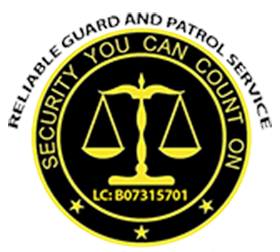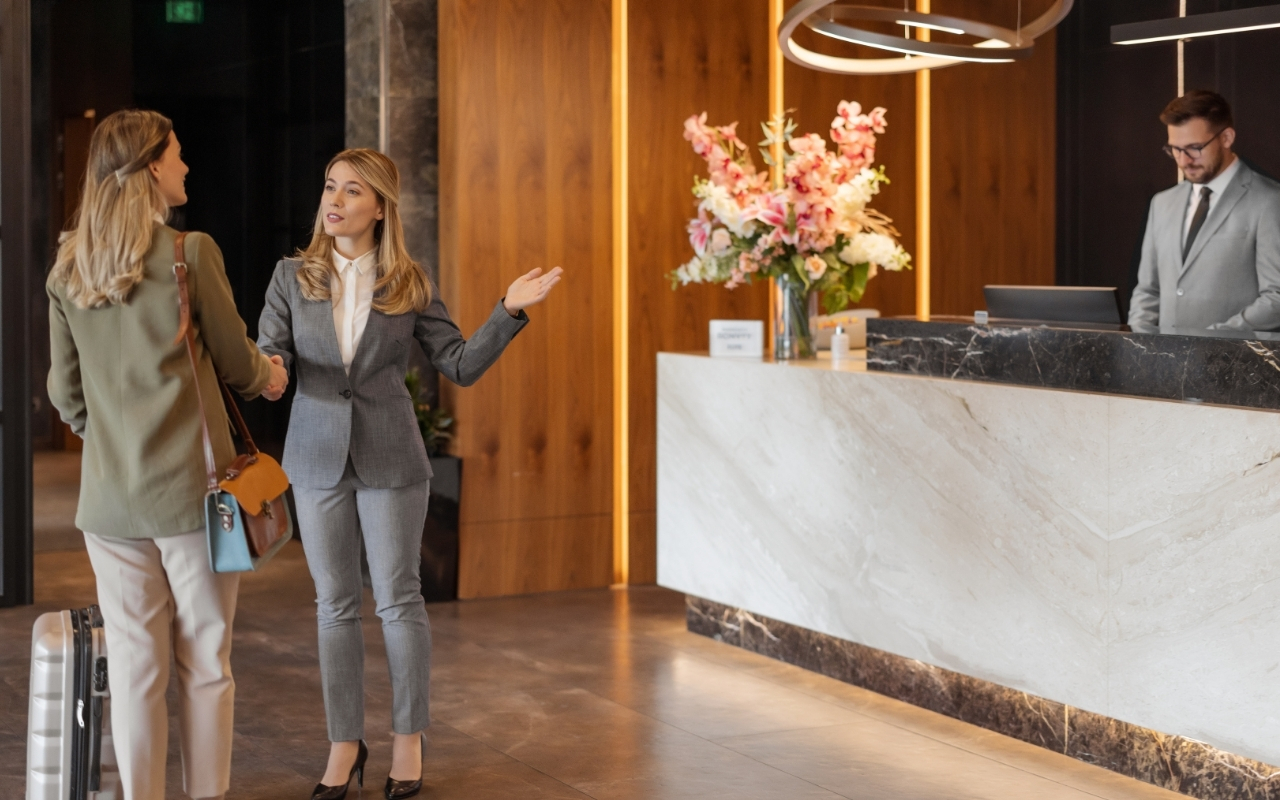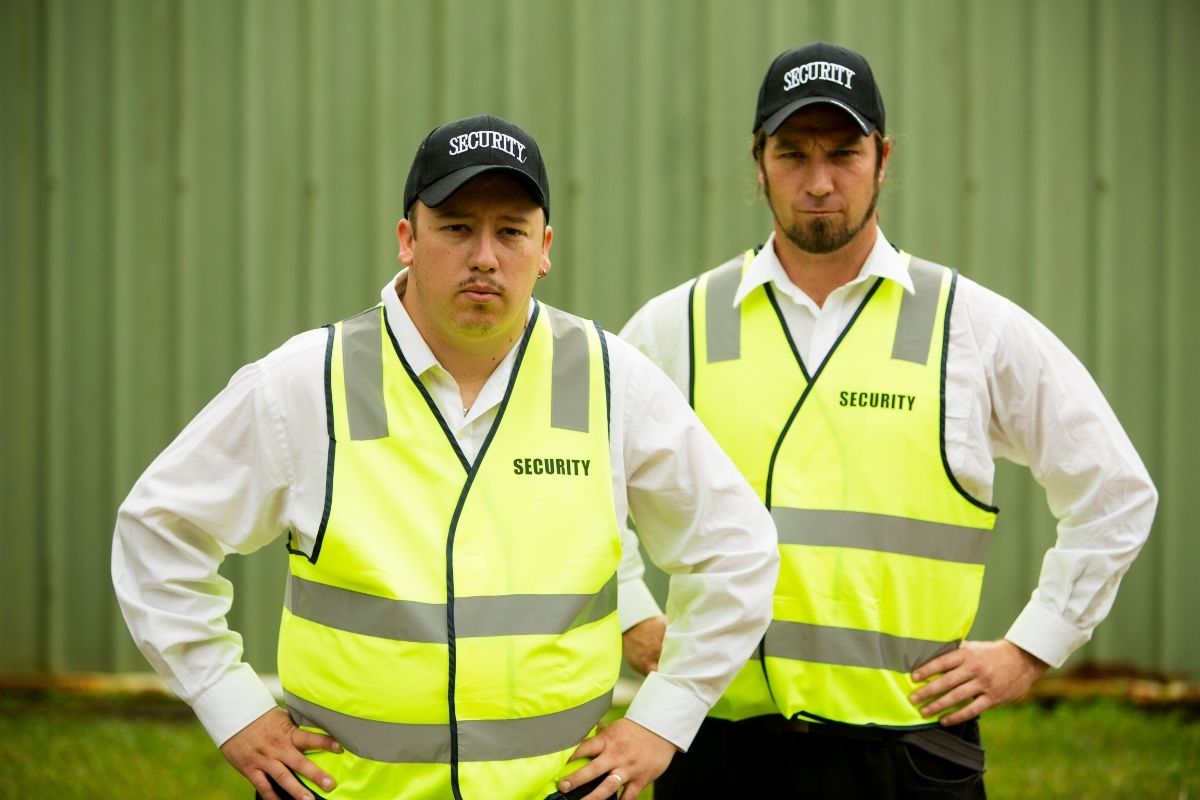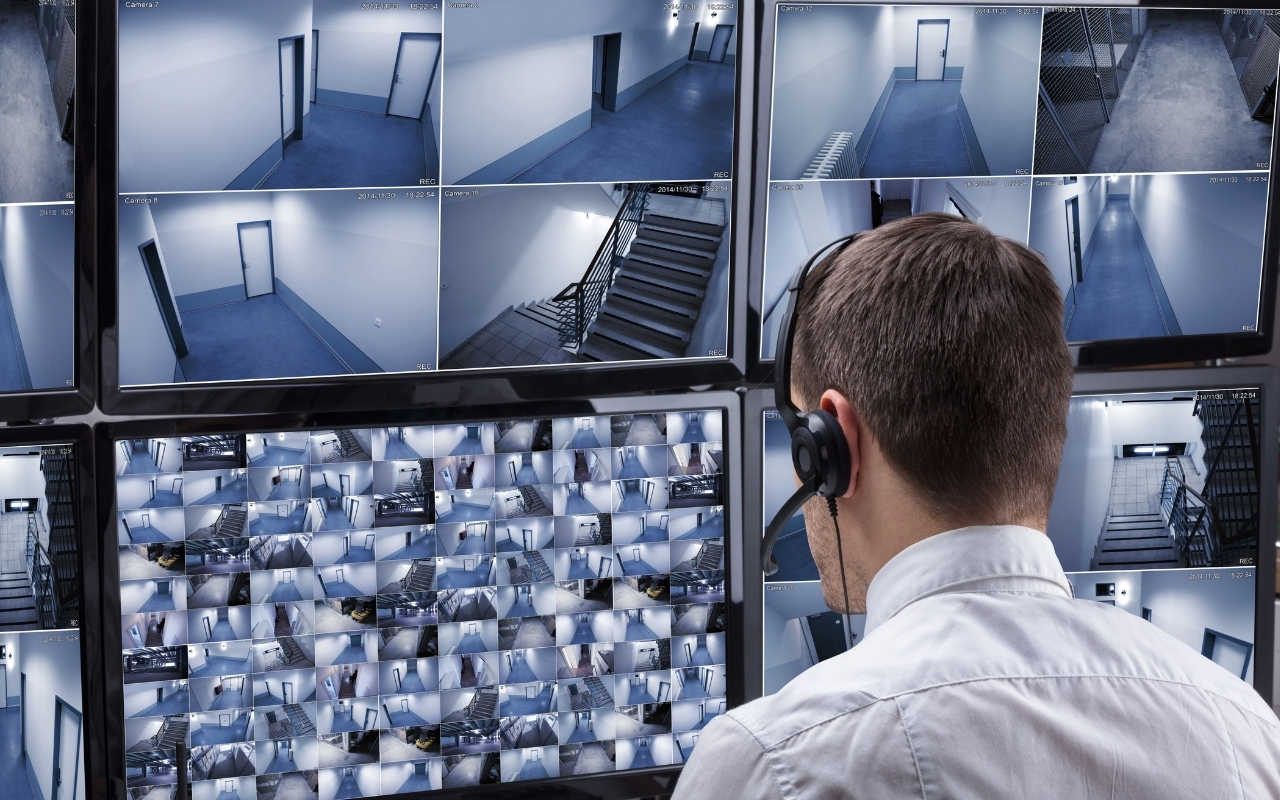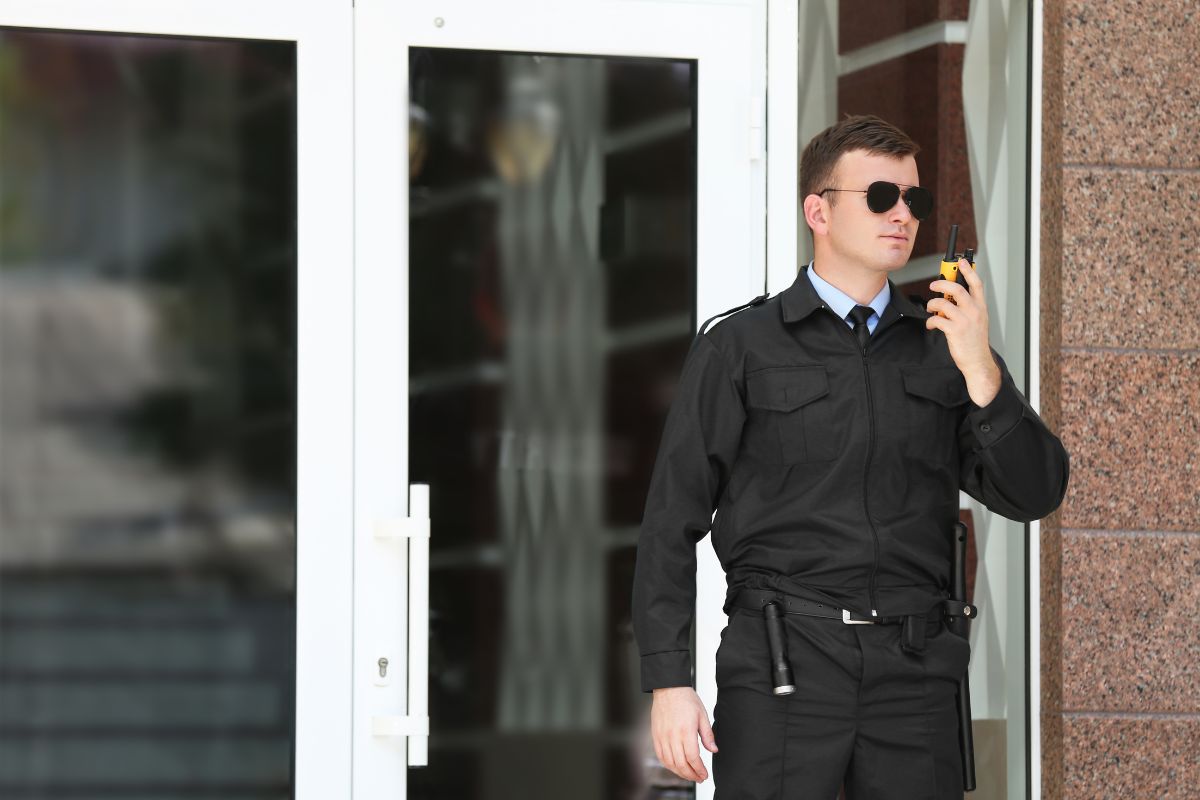
- Thu, Sep 2025
- |
- Reliable Houston Security Guard Service, Inc
Armed security officers are licensed professionals who protect people, property, and assets while carrying firearms as part of their authorized duties. These officers undergo specialized training in weapons handling, crisis management, and law enforcement procedures to maintain safety in high-risk environments like banks, hospitals, government facilities, and corporate buildings. For businesses seeking professional armed security guard services, understanding these responsibilities is crucial.
Primary Responsibilities of Armed Security Officers:
- Threat Prevention: Conduct regular patrols and surveillance to identify potential security risks before incidents occur
- Emergency Response: Provide immediate intervention during critical situations including active threats, medical emergencies, and evacuation procedures
- Access Control: Monitor entry points, verify credentials, and prevent unauthorized access to restricted areas
- Law Enforcement Coordination: Work directly with police during investigations and emergency situations
- Incident Documentation: Maintain detailed reports of security events for legal and administrative purposes according to ASIS International standards
Essential Requirements:
- State licensing and firearms certification
- Background checks and psychological evaluations
- Physical fitness standards and medical clearance
- Ongoing training in use of force laws and de-escalation techniques
- Knowledge of local, state, and federal security regulations
Armed security officers differ from unarmed security personnel by carrying lethal weapons and handling higher-risk situations that may require armed intervention. They possess limited arrest powers (citizen’s arrest) but must coordinate with law enforcement for formal arrests and prosecutions.
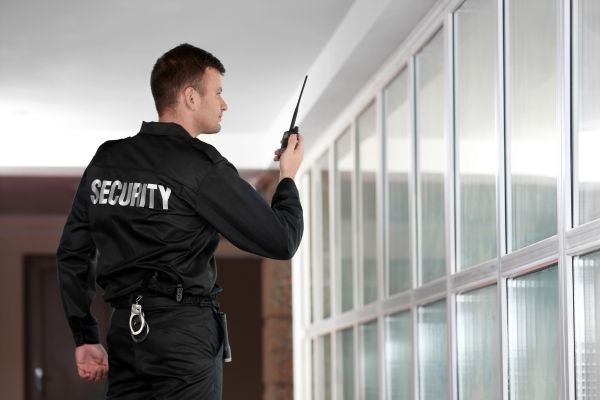
What Does an Armed Security Officer Do
Carrying weapons is only one part of an armed security officer’s daily work. Their main job focuses on protecting people, buildings, and valuable items from danger. These officers receive advanced training to handle serious and risky situations safely, whether providing building security guard services or protecting other facilities.
Beyond stopping threats and providing protection, armed security officers excel at finding problems early. Their sharp observation skills work with continuous training to spot security risks quickly. This allows them to act fast and stop problems before they get worse. The Security Industry Association emphasizes these preventive measures as critical to effective security operations.
Armed security officers also serve as important watchers of security equipment and systems. They must understand these systems completely to keep them working properly. This includes regular inspections and quick fixes when alarms sound or issues arise.
Another important duty involves working with police officers during emergency situations. They must coordinate smoothly and help law enforcement with their important work. Armed security officers connect on site security with outside help when needed most, particularly when providing warehouse security guard service where rapid response is essential.
What Skills Do Armed Security Officers Need
The advanced abilities of an armed security officer take years of training to develop. These professionals show impressive physical strength combined with sharp mental skills. Their jobs require quick reactions and smart decisions during critical moments. Building these essential skills requires dedication and continuous learning throughout their entire career, which professional security services prioritize in their training programs.
Key skills that every armed security officer must master include:
- Strong observational abilities to spot warning signs and predict potential problems before they escalate
- Quick decision-making skills that help them respond effectively during high-pressure emergency situations
- Physical fitness and strength to handle demanding tasks and challenging confrontational encounters
- Mental agility and sharp thinking to assess threats and develop appropriate response strategies
- Weapon handling expertise and firearms training to use equipment safely and responsibly
- Crisis management abilities to control difficult situations and maintain order during chaos
Being watchful means more than just looking around carefully all day long. It requires studying details closely and making fast choices to prevent immediate harm. Deep understanding of laws is essential for every armed security officer working today. This includes weapon laws and private security regulations that guide their daily actions. Legal knowledge helps them handle confrontations while staying within proper boundaries at all times, as outlined by NASCO guidelines. Excellent people skills and communication abilities are also very important for long-term success. Armed security officers interact with many different types of people every single day. These include employees, clients, visitors, and law enforcement officers who need their professional assistance.
Understanding Legal Rules for Armed Security Officers
Armed security officers work within many complicated legal rules and requirements every day. They must protect property and save lives while following specific legal guidelines carefully. Making mistakes can lead to serious consequences or court cases for both officers and employers. Understanding these complex legal frameworks is absolutely essential for professional success and career advancement at professional security companies.
Critical legal areas that armed security officers must understand completely include:
- Proper firearm usage laws and regulations that govern when weapons can be drawn
- Search and seizure procedures that protect individual rights while maintaining security effectiveness
- Use of force guidelines that determine appropriate response levels during various threatening situations
- Evidence preservation requirements that ensure proper documentation and chain of custody protocols
- Incident reporting standards that maintain accurate records for legal and administrative purposes
- Cooperation protocols with law enforcement agencies to ensure smooth coordination during emergency responses
One major responsibility involves using power wisely, especially when handling firearms during dangerous situations. Armed security officers must know exactly when to draw weapons and when other options work better. Every decision to use a firearm must be smart, legal, and based on facts. The Department of Labor safety guidelines provide essential frameworks for these decisions. These officers must also understand the legal rules about searching people and property completely. Armed security officers may need to conduct searches in certain situations that require careful attention. Following proper procedures while respecting individual rights is both a legal requirement and moral duty. Understanding how to work legally with law enforcement represents another critical area of responsibility, especially for those providing security guard services in Houston TX.
Risk Assessment and Threat Evaluation Methods
Armed security officers must constantly evaluate potential risks and assess threats in their work environment. This ongoing process requires careful attention to details and the ability to recognize danger signs early. Effective threat evaluation helps prevent incidents before they happen and keeps people safe from harm. These skills develop through experience, training, and continuous observation of changing conditions and suspicious activities, particularly important when providing event security services.
Important risk assessment activities that armed security officers perform regularly include:
- Environmental scanning to identify potential vulnerabilities in buildings, parking areas, and surrounding properties
- Behavioral analysis of individuals to spot suspicious activities, unusual movements, or threatening body language
- Access point evaluation to ensure all entrances, exits, and restricted areas maintain proper security measures
- Crowd monitoring during events to detect potential disturbances, fights, or emergency situations before they escalate
- Technology assessment to verify that all security systems, cameras, and alarms function correctly throughout shifts
- Intelligence gathering from various sources to stay informed about potential threats or criminal activity patterns
Successful threat evaluation requires armed security officers to think like potential criminals or troublemakers. They must consider how someone might try to cause harm or commit crimes. This mindset helps them identify weak spots in security and fix problems quickly. Officers also work closely with local law enforcement to share information about suspicious people or activities, as recommended by the Private Security Professionals of America. Regular training updates help them learn about new threats and better evaluation methods. Creating detailed reports about potential risks helps supervisors make important decisions about security improvements and resource allocation.
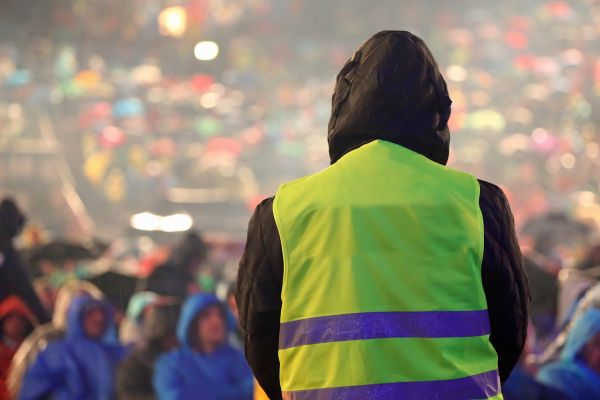
How Armed Security Officers Keep Everyone Safe
An armed security officer often serves as the first protection when public safety faces threats. Their alertness and quick response time can stop small problems from becoming dangerous situations. These officers play a vital role in making people feel secure and protected, whether at shopping centers or other public spaces.
Daily work for these officers includes patrolling assigned areas and finding potential dangers before they happen. With trained eyes, they check the environment and spot things that could harm people or property. Their success shows in the lack of incidents in areas they protect and monitor, following OSHA safety standards.
Public safety goes beyond physical dangers and includes protecting valuable assets and property from harm. Armed security officers also guard against theft, damage, and other destructive incidents that threaten communities. Through quick and smart actions, they keep public spaces welcoming and safe for everyone.
Stepping in during emergency situations further proves how armed security officers help maintain public safety. Their presence during critical moments prevents panic, maintains order, and guides people away from danger. Their knowledge of emergency procedures and calm behavior help ensure everyone stays safe during difficult times, particularly when working with hotel security guard services.
What Armed Security Officers Do Every Day
A typical day for an armed security officer is never the same as the day before. Even with planned routines and regular patrols, each day brings new situations that need careful handling. Their extensive training and readiness help them handle every daily challenge with skill and confidence. These professionals must be prepared for anything that might happen during their assigned shifts.
Essential daily activities that armed security officers perform include:
- Morning area inspections to examine all spaces and look for unusual things or signs of trouble
- Continuous monitoring of security systems and equipment to ensure everything functions properly
- Regular patrol walks throughout assigned areas to maintain visible presence and detect potential problems
- Incident response and emergency management when situations require immediate professional attention
- Documentation and report writing to record all activities and incidents during their work shifts
- Communication with other security personnel and law enforcement officers when coordination is needed
The morning shift often starts with careful inspection of all areas under their protection. They examine every part of their assigned space, looking for unusual things or signs of trouble. This detailed attention sets the foundation for their entire work shift and helps prevent problems. During the day, they stay highly alert and ready to respond to any changes quickly, as highlighted in Security Today magazine. Many work from a security office where they watch systems and take walks. Their workday ends with a complete report that records all incidents that happened. This documentation helps them remember important details and assists incoming officers with valuable information, whether they’re security officers in Pearland TX or other locations.
How to Handle Tough Situations as an Armed Security Officer
Working as an armed security officer means dealing with many challenging and difficult situations regularly. How well they manage these challenges directly affects what happens in each situation. Every difficult situation is different and requires careful, customized responses that fit the specific circumstances. Success depends on proper training, experience, and the ability to remain professional under pressure.
Key strategies for managing difficult situations effectively include:
- Maintaining calm composure under pressure to think clearly during chaotic and stressful moments
- Using effective communication and negotiation skills to deescalate tense situations without physical confrontation
- Applying tactical training wisely when other peaceful resolution methods have failed completely
- Understanding human behavior patterns to predict actions and respond appropriately to various personality types
- Balancing authority with respect to maintain control while treating all people with dignity
- Following proper escalation procedures to ensure situations are handled according to established protocols
Staying calm under pressure is one of the most important skills for managing difficult conditions effectively. The ability to think clearly during chaotic moments can determine whether situations improve or worsen. Clear thinking helps them create smart action plans that work well in tough circumstances, particularly important at construction site security locations. Another key factor is their ability to calm down tense situations quickly without making things worse. Many conflicts can be resolved through good communication and smart negotiation without physical fighting. The final part of their strategy involves using tactical training wisely when other options fail. Physical force should always be the last choice, but when needed, it must be used carefully, as noted in InfoSecurity Magazine.
Equipment and Technology Used by Armed Security Officers
Armed security officers rely on various specialized equipment and technology to perform their duties effectively. Modern security work requires much more than just firearms and basic communication devices. Today’s officers use advanced tools that help them prevent crimes, respond to emergencies, and maintain safety standards. Proper training on all equipment is essential for officer safety and job effectiveness.
Essential equipment that armed security officers use regularly includes:
- Firearms and ammunition with proper holsters and safety equipment for personal and public protection
- Two-way radios and communication systems to stay connected with team members and emergency services
- Body armor and protective gear designed to shield officers from various threats and physical harm
- Security cameras and monitoring systems that provide real-time surveillance of assigned areas
- Access control devices like key cards, biometric scanners, and electronic locks for building security
- Emergency medical supplies including first aid kits and automated external defibrillators for health emergencies
Technology continues to change how armed security officers work and protect their assigned areas. Digital surveillance systems allow officers to monitor multiple locations from central command centers efficiently. Mobile devices and apps help them track incidents, communicate with supervisors, and access important information quickly. Many officers now use body cameras to record interactions and provide evidence when needed, especially security officers in Sugar Land TX and other modern facilities. Metal detectors and x-ray machines help screen visitors and prevent dangerous items from entering buildings. GPS tracking systems ensure officers complete their patrol routes and respond to emergencies faster than ever before. The Houston Business Community recognizes these technological advances as essential for modern security operations.
Conclusion
Armed security officers play a vital role in protecting our communities and keeping people safe. Their work combines physical skills, mental sharpness, and legal knowledge to handle any situation effectively. From daily patrols to emergency responses, these professionals demonstrate dedication and courage every day. The comprehensive training and ongoing education they receive prepare them for the challenges ahead. Companies can learn more about our services and how professional armed security enhances safety.
The security industry continues to evolve with new technology and changing threats around us. Armed security officers must adapt to these changes while maintaining their core mission of protection. Their commitment to public safety makes them essential guardians in our modern world. Consider pursuing this rewarding career if you want to make a real difference. For businesses seeking professional security solutions, contact us to discuss your specific needs. Our BBB-accredited services ensure quality and reliability for all security requirements.
FAQs
What training is required to become an armed security officer?
Armed security officers need specialized firearms training and state licensing before starting work. Most states require background checks, psychological evaluations, and ongoing education to maintain their qualifications.
What work environments do armed security officers typically work in?
Armed security officers work in various settings including hospitals, banks, corporate buildings, and events. Each environment presents unique challenges and requires specific skills to handle different security needs.
What are the main differences between armed and unarmed security officers?
Armed officers carry firearms and handle higher-risk situations that require weapons for protection. Unarmed officers focus on observation, reporting, and customer service without carrying deadly weapons.
What physical requirements must armed security officers meet for employment?
Most employers require good physical fitness, clear vision, and hearing abilities for safety reasons. Officers must pass medical examinations and maintain their health throughout their security careers.
Can armed security officers make arrests like police officers do?
Armed security officers have limited arrest powers that vary by state and jurisdiction. They can detain suspects for police but cannot conduct full arrests like sworn officers.
